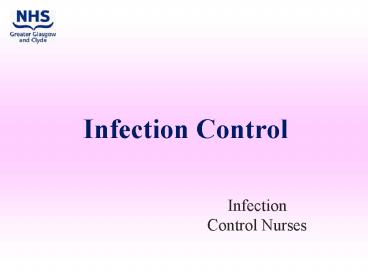Infection Control - PowerPoint PPT Presentation
1 / 23
Title:
Infection Control
Description:
Standard precautions is the minimal level of infection control ... linen. Clinical waste. Body fluid spills. Accommodation. Clean environment. Preventing ... – PowerPoint PPT presentation
Number of Views:36
Avg rating:3.0/5.0
Title: Infection Control
1
Infection Control
- Infection Control Nurses
2
To be discussed
- Changing frameworks
- HAI and implications of HAI
- Standard Precautions
- MRSA
- C. difficile
3
Changing frameworks 1980s
Alert new disease AIDS No significant resistant
organisms
4
Changing frameworks 1990s
MRSA, VRE, resistant coliforms VISA, HIV, HCV,
HBV, etc., etc., Experiencing interference
5
Changing frameworks 2000s
We got Gram negatives resistant to
everything. We got VRSA. And the public know we
dont do hand hygiene properly
Chronic winter bed shortage
6
Healthcare Acquired Infection (HAI)
- Definition
- Not present or incubating on admission.
- 10 of all patients admitted to hospital
- will develop a healthcare acquired infection.
7
Implications of HAIs
8
(No Transcript)
9
Standard precautions is the minimal level of
infection control precautions that apply to all
patients at all times in all situations.
10
Clean environment
Hand Hygiene
PPE
There are 9 elements to Standard Precautions
Clinical waste
Accommodation
Body fluid spills
Patient care equipment
11
Hand Hygiene
12
(No Transcript)
13
Clinical waste
14
(No Transcript)
15
Body fluid spills
16
- Cover any cuts or abrasions with waterproof
dressings - Vaccinate against Hep B
17
Who is responsible for implementing Standard
Precautions?
18
We all are. All Employees must follow the
Standard Precautions Policy.
19
If patient has diarrhoea send a sample and
isolate. Clearance criteria 48 hours of no
symptoms.
Clostridium difficile
Some strains produce toxins. Can cause mild
diarrhoea or severe disease, e.g. toxic mega
colon leading to death.
Hands implicated
Relapses/reinfections are common (20-30).
Follow careplan and give patient Information
leaflets.
Faeces has a characteristic odour (horse manure)
blood, mucous or watery green diarrhoea.
Can survive normal cleaning and chemical
disinfection because it forms spores. Cleaning is
therefore vital.
20
Staphylococcus aureus and MRSA
Spreads via direct contact e.g. hands, indirect
contact e.g. equipment, airborne e.g during
bed-making dressing changes as skin scales are
dispersed through the air.
Many different strains, some resistant to
methicillin.
Can survive in dry conditions for months.
30-50 of humans carry S. aureus in their nose.
Hands implicated.
Causes a variety of infections e.g.wound and
chest infections.
Standard disinfection satisfactory.
Follow MRSA policy, use careplan and MRSA
leaflets.
21
- We are here to help and support
- all staff, so please use us!
- If you suspect there is something
- wrong with a patient or a procedure,
- dont wait, tell us so that we can help
- you to prevent further problems.
22
(No Transcript)
23
One last thing
- What have you just done?
- What are you about to do?
- Remember your hand hygiene!































